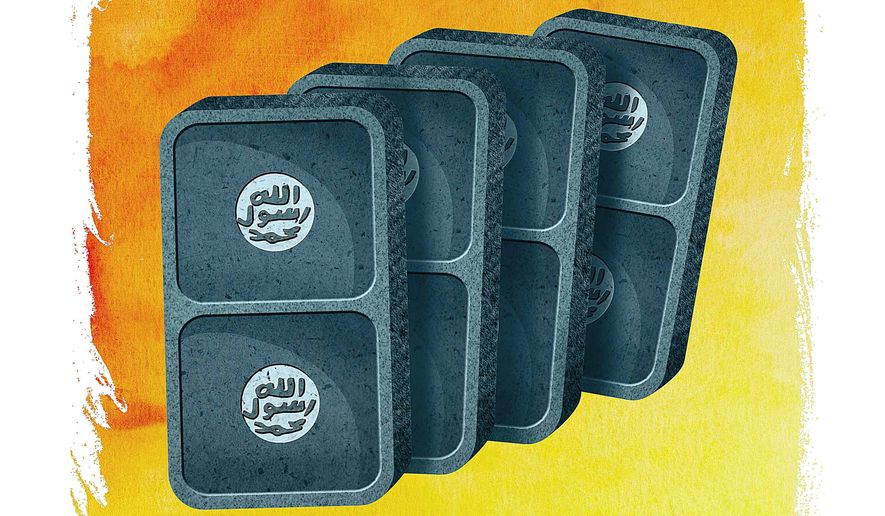OPINION:
The Israeli Defense Forces have fortified the front face of the Golan Heights. If you stand on top of the heights and look to the northeast, you can see Damascus as a smudge in the distance. Snow-capped Mount Harmon is on your left. The IDF sergeant who is taking you around will tell you that his fellow soldiers, using their electronic ears, can hear “the Syrian crew chief in Damascus firing up the T-72s every morning.” The crew chief starts up each tank, brings the engine up to operating temperatures, checks all the gauges, shuts it down, and then moves to the next one.
The Israeli border and Damascus are that close.
On June 4, 2009, President Obama gave a speech in Cairo which the White House website continues to call “A New Beginning.” In the six years since, life for ordinary Egyptians, Tunisians, Libyans and certainly Syrians is very different. In January, the United Nations estimated that 230,000 Syrians had lost their lives in the Syrian civil war. That number is probably close to a quarter-million by now, if not more. The U.N. also estimates that more than 4 million Syrians have fled the country and something on the order of another 8 million are “internally displaced” — i.e., refugees in their own country, for a total of 12 million Syrians who have lost their homes. There is no way to estimate other losses — businesses destroyed, critical infrastructure such as electricity, water, gas and sewer systems wrecked, roads too dangerous for innocent travel. Syrian Christianity has been present since Saint Paul was converted on the road to Damascus, but it’s an open question on whether it has any future. Even Islamic sites have suffered as the Islamic State, also called ISIS, and its opponents argue the finer points of religion with plastic explosives.
No one would suggest that on June 4, 2009, Syria was Paradise on Earth but a quarter-million Syrians who were alive on that day are not now. Twelve million Syrians who had homes on that day don’t have them now. That’s 12 million “no” answers to the question, “Are you better off?”
If the current human rights situation for Syrians can only be described as “catastrophic,” what about the geopolitical changes, if any?
A lot depends on who ultimately comes out on top. First, there is President Bashar Assad and his Iranian supporters. There is a feeling among many Middle Eastern observers that the tide is beginning to run against Mr. Assad. For one thing, he is simply not able to replace soldiers who are killed or wounded, and as time passes, the numbers needed to control the whole country aren’t there. There is some speculation that he may have to retreat to his Alawite tribal homeland along the Mediterranean coast north of Lebanon. He might be able to hold out there because the Alawites have no place to retreat. The sea is at their backs.
The second player is a mixed group of anti-Assad rebels, some of which are associated with al Qaeda, some of which are not, some of which are allies of other groups but sometimes not. The Obama administration has been trying to help out the non-al Qaeda portion of this group but without a lot of luck. It’s hard to imagine a scenario in which a non-Assad, non-al Qaeda, loose confederation of rebels could ultimately triumph.
Then there is ISIS. If the death cult conquers Syria or most of it, including Damascus, it will be right up against the border of Israel. Commenting on the difference between having Assad as a neighbor and ISIS as a neighbor, a retired Israeli ambassador with a lot of national security experience had this to say: “Assad’s vision ends within the boundaries of Syria, while the vision of the members of his opposition is — at least — regional and very anti-USA.”
One immediate question for the United States and its allies is this: In an ISIS-conquered Syria, what happens to Assad’s weapons of mass destruction program? The Syrian regime has at least the know-how to make chemical and maybe biological weapons. The nuclear plant the North Koreans were building for Assad was destroyed, but the know-how and maybe some of the technology are in Damascus somewhere. There is also ballistic missile technology and some actual weapons controlled by Assad. We can expect that ISIS would inherit some of this.
In summary, since Mr. Obama’s Cairo speech, life for ordinary Syrians has been horrific. Those results are tallied. While the geopolitical fallout for Syria is still to be determined, the trend lines point to at least an equal disaster. By next summer if not sooner, Team Obama, including former Secretary of State Hillary Rodham Clinton, will have to make a convincing case for “it’s not our fault.”
• William C. Triplett II is a former chief Republican counsel to the Senate Foreign Relations Committee.




Please read our comment policy before commenting.